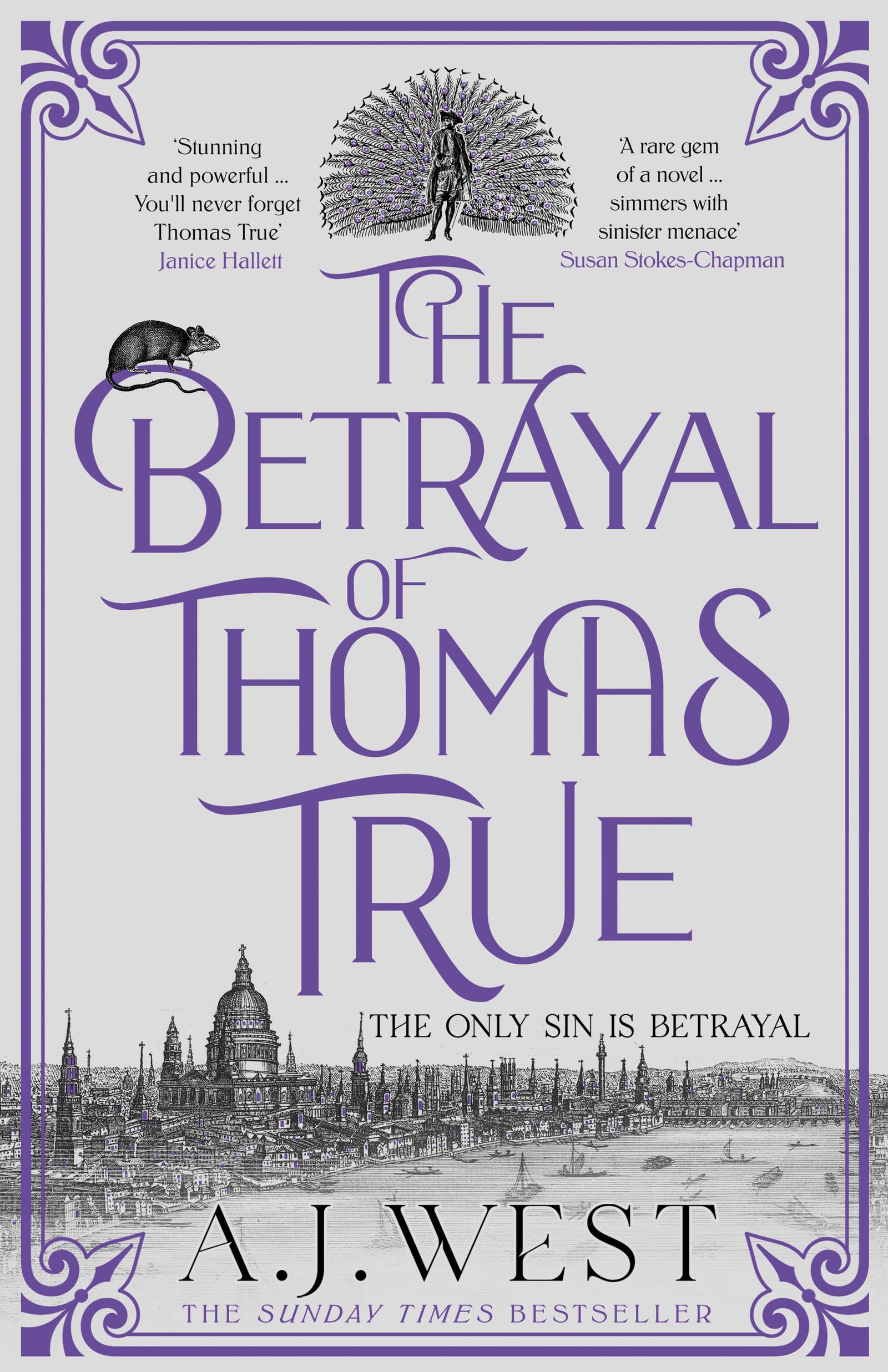Published by Orenda Books.
This review of the hardcover of "The Betrayal of Thomas True" was originally published in July 2024. It has been updated to display the paperback cover, which is lovely!
I love books that open up new worlds for me, especially novels that are based on historical people and events. In the 18th century, London was known and admired as a prosperous city. But it was full of contradictions; the city was also teeming with the destitute; men without work, women and children begging in the streets for food and a bed for the night. In “The Betrayal of Thomas True”, A.J. West has created a fascinating narrative about the “mollies” and molly-houses of this era. A helpful definition from Atlas Obscura:
In 18th and early-19th-century Britain, a “molly” was a commonly used term for men who today might identify as gay, bisexual or queer…A whole molly underworld found its home in London, with molly houses, the clubs and bars where these men congregated, scattered across the city like stars in the night sky.—Natasha Frost
The book begins with the title character escaping his abusive father and stifling rectory life by running away to London. He believes that in a big city far away, he won’t be judged for who he is, although Thomas isn’t sure yet who that might be. Thomas hopes that his Uncle Squink, a chandler, will employ him as an apprentice candle maker. He plans to live with his aunt and uncle and their unmarried daughter Abigail, a childhood playmate.
As he nears London on the coach, Thomas is filled with wonder and excitement:
“and there was London rolling up on the horizon, grim and grand, the freshly budded dome of St Paul’s Cathedral gleaming amidst a morass of timber and brick. Far below, the distant spires rang with happy bells, calling God’s children to prayer. ‘My new home,’ thought Thomas as they descended the cleft of the valley. ‘My new life.”
It doesn’t take long for things to go awry. Thomas, (who is clumsy in both word and deed) falls off the London coach, losing all his belongings. While wandering about, he runs into Jack Huffins, a young boy whose molly name is “Sweet Jacky”, and Thomas’ new life begins. Jacky takes Thomas to the infamous Mother Clap’s Molly House, and the sheltered Thomas is understandably enraptured; he’s found his milieu:
“…He was standing in a cavernous hall two storeys high, ringed with a lofty balcony, its railings trimmed with candles in multi-coloured balls of glass…a vision in blue feathers strutted past him, spinning a wheel of lanterns above her head…There were ten or more such creatures weaving their way through the crowd, their lantern wheels slapping the walls with glancing diamonds as white clouds burst green and red above their heads like enchanted cannon fire.”

As Thomas settles in with the Squink family, the author introduces us to carpenter Gabriel, who’s in business with his friend Henry Sylva. Gabriel is in mourning for the deaths of his wife and daughter, but he also has a secret: As the molly “Lotty Lump”, he guards the door of Mother Clap’s. Gabriel is not exactly comfortable in his own skin:
“How he hated the sound of his own voice, especially when he was sad: too soft for a man of his size, so feeble he could tear out his own tongue.”
Most of the mollies, like Gabriel, keep their “normal” and molly lives separate. They are husbands, fathers, respected businessmen. However, some of them are reckless enough to parade through the streets in their molly garb of gowns and wigs. There are organized gangs in London who beat and murder them, and the local constabulary is no less cruel. But these gangs are not the only danger. The other threat comes from Justices Grimp and Myre (I love West’s Dickensian names). These two travel around in a coach looking like plague doctors, with “false noses stuffed with herbs strapped about their heads like raven’s beaks to ward off the putrid stench.”

The justices are rooting out and punishing “evil-doers” and are approaching London quickly. Their goal is to destroy the mollies and toward that goal, they periodically get inside information from the mysterious “Rat”. West hides the identity of this informant very well; a single word gave me a clue as to who the Rat was.
The world becomes more perilous for the mollies; some of them are killed or have fled. The power of West’s writing is such that every character’s loss hits hard. The justices, the constabulary and the gangs are merciless, primitive and bloodthirsty in sharp contrast to Thomas and his friends. All they want is to live and love in peace, but their time and place makes that impossible.

West’s is a perceptive and empathetic writer; his characters are complex, unique and sharply drawn. He shows compassion and understanding in his portrayal of the mollies and their companions. I’d particularly like to single out the “spider children”, known as The Blackguard (also drawn from history.) Here West’s imagination really shines. These lost children live in a huge chimney, their rags sparkle with shards of glass and they chant riddles and clues in an “inhuman metallic sound.” They play an important role in the story and add to the strangeness and wonder of the book.
West has created a tale that is so much more than a mystery to be solved. Although it’s set in the 18th century, its themes are timeless. “Thomas True” is ultimately about what it means to be different, and how those who don’t conform find family, love and support in each other. The thread that runs through the book is about discovering and most importantly, being able to accept who you really are. It’s a long and hard journey for Thomas, Gabriel, Jack, and the rest of the mollies, and not everyone makes it. It’s to West’s credit that we care so deeply about the outcome and hope that the cry of “WE ARE MOLLIES. ALWAYS TOGETHER” rings through the ages.

Please buy/order “The Betrayal of Thomas True” at your local independent bookstore or visit Bookshop.org.
For audiobooks, visit libro.fm





